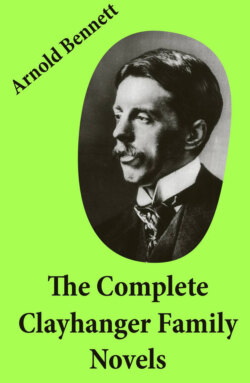Читать книгу The Complete Clayhanger Family Novels (Clayhanger + Hilda Lessways + These Twain + The Roll Call) - Arnold Bennett - Страница 194
На сайте Литреса книга снята с продажи.
Chapter 8. A Change of Mind.
ОглавлениеTable of Contents
One evening, a year later, in earliest summer of 1887, Edwin and Mr Osmond Orgreave were walking home together from Hanbridge. When they reached the corner of the street leading to Lane End House, Osmond Orgreave said, stopping—
“Now you’ll come with us?” And he looked Edwin hard in the eyes, and there was a most flattering appeal in his voice. It was some time since their eyes had met frankly, for Edwin had recently been having experience of Mr Orgreave’s methods in financial controversy, and it had not been agreeable.
After an instant Edwin said heartily—
“Yes, I think I’ll come. Of course I should like to. But I’ll let you know.”
“Tonight?”
“Yes, to-night.”
“I shall tell my wife you’re coming.”
Mr Orgreave waved a hand, and passed with a certain decorative gaiety down the street. His hair was now silvern, but it still curled in the old places, and his gestures had apparently not aged at all.
Mr and Mrs Orgreave were going to London for the Jubilee celebrations. So far as their family was concerned, they were going alone, because Osmond had insisted humorously that he wanted a rest from his children. But he had urgently invited Edwin to accompany them. At first Edwin had instinctively replied that it was impossible. He could not leave home. He had never been to London; a journey to London presented itself to him as an immense enterprise, almost as a piece of culpable self-indulgence. And then, under the stimulus of Osmond’s energetic and adventurous temperament, he had said to himself, “Why not? Why shouldn’t I?”
The arguments favoured his going. It was absurd and scandalous that he had never been to London: he ought for his self-respect to depart thither at once. The legend of the Jubilee, spectacular, processional, historic, touched his imagination. Whenever he thought of it, his fancy saw pennons and corselets and chargers winding through stupendous streets, and, somewhere in the midst, the majesty of England in the frail body of a little old lady, who had had many children and one supreme misfortune. Moreover, he could incidentally see Charlie. Moreover, he had been suffering from a series of his customary colds, and from overwork, and Heve had told him that he ‘would do with a change.’ Moreover, he had a project for buying paper in London: he had received, from London, overtures which seemed promising. He had never been able to buy paper quite as cheaply as Darius had bought paper, for the mere reason that he could not haggle over sixteenths of a penny with efficient ruthlessness; he simply could not do it, being somehow ashamed to do it. In Manchester, where Darius had bought paper for thirty years, they were imperceptibly too brutal for Edwin in the harsh realities of a bargain; they had no sense of shame. He thought that in letters from London he detected a softer spirit.
And above all he desired, by accepting Mr Orgreave’s invitation, to show to the architect that the differences between them were really expunged from his mind. Among many confusions in his father’s flourishing but disorderly affairs, Edwin had been startled to find the Orgreave transactions. There were accounts and contra-accounts, and quantities of strangely contradictory documents. Never had a real settlement occurred between Darius and Osmond. And Osmond did not seem to want one. Edwin, however, with his old-maid’s passion for putting and keeping everything in its place, insisted on one. Mr Orgreave had to meet him on his strongest point, his love of order. The process of settlement had been painful to Edwin; it had seriously marred some of his illusions. Nearly the last of the entanglements in his father’s business, the Orgreave matter was straightened and closed now; and the projected escapade to London would bury it deep, might even restore agreeable illusions. And Edwin was incapable of nursing malice.
The best argument of all was that he had a right to go to London. He had earned London, by honest and severe work, and by bearing firmly the huge weight of his responsibility. So far he had offered himself no reward whatever, not even an increase of salary, not even a week of freedom or the satisfaction of a single caprice.
“I shall go, and charge it to the business,” he said to himself. He became excited about going.
